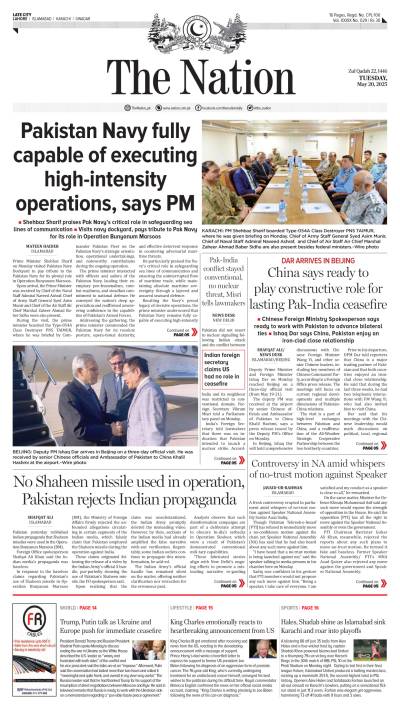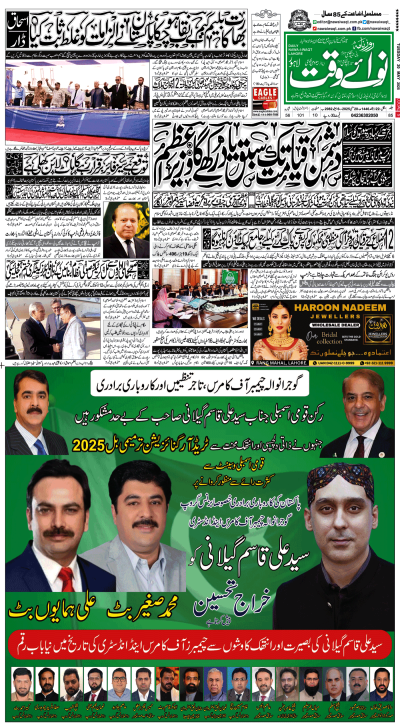LAHORE - Importance of continued training becomes all the more important with the approval of Generalized System of Preference (GSP) Plus status for Pakistan by the European Union (EU). Steady increase in skilled work force is a crucial lynchpin to hook up with internationally competitive textiles and garment industry.
These were the reflections shared by Regional Director, National Vocational and Technical Training Commission (NAVTTC), Hassan Nasir Jamy, while presiding over the graduation ceremony of training of trainers on ‘Apparel Manufacturing and Management’, organized by the UNDP PEPGI project Punjab chapter at a local hotel.
Mehmood ul Hassan was PEPGI representative on the occasion.
“There is a tremendous potential for clothing industry in Pakistan, with the textiles sector providing employment to about 40% of industrial labor force. We will get access to the EU market through duty free export quota under GSP Plus. Hence, garment production will increase times. Thus, the need for vocational trainings has become an imperative,” he said.
“There is need to harmonize the efforts of training institutes imparting similar trainings to ensure optimum use of scarce resources. Synergies and effective coordination between these training institutions and their curricula would help the sector to employ the much needed skills,” he recommended.
Regional Director NAVTTC congratulated participating garment units, UNDP, private and public sector for coordinated efforts, which have made PEPGI Project a success story. “We express our utmost support to PEPGI Project in promotion of garment industry,” he said.
“I have transferred international best practices and latest skills in the garment industry acquired over the years. We and our Master Trainers will further train workers and the middle management at Satellite Training Units (STUs) established in participating garment units. We will conduct a performance gap analysis in respective garment units and will subsequently offer consulting guidelines to bridge the gaps identified at gap analysis stage,” said the Consultant Technopak, Sudath Geegana Gamachchige. GM Operations, Azgard-9, Habib Abbasi, while dilating upon the role of capacity building of work force in promotion of garment industry said, “Growth curve of the companies investing more on capacity building is much faster than those enterprises, which consider it as a mere expense.
Training triggers overall development by enhancing skills, reforming behaviors and cultivating positive attitudes. Organization enjoys multiple growth by patronizing capacity building initiatives. Training develops the individuals, family, organization, society and nation. We noticed confidence, motivation, dedication and conviction in trainees. This training has delivered a lot more than our expectations. We can work with effective pace or speed. What we need is focus, vision and long term approach for translating ideas into ideals. Learning, an endless process leads to knowledge, experience, and expertise.”
“Much more skilled work force will be needed to cater to the increased demand of garment industry products, after GSP Plus status granted to Pakistan, reflected Principal Pakistan Readymade Garments Technical Training Institute, Kamran Yousaf Sandhu. Representative of Advance Fashion (Pvt.) Limited, Tahir Rasool appreciated Training of Trainers as an exemplary initiative. He expressed the need of promoting such trainings for developing a pool of much needed skilled work force in garment industry.
While sharing PEPGI background, the National Project Manager, PEPGI Project, Sindh, Syed Muhammad Nawab said, “We selected 1,100 candidates for Training of Trainers (ToT) after assessing 150,000 candidates. These candidates further trained 20,000 garment industry workers as envisaged under five year UNDP Gender Promotion in Garment Industry (Gen-Prom) project, initiated in 2005. This trained workforce is cumulatively earning PKR 200 million every month.”
“Skilled labour force has always been a key to exploit the potential of our clothing industry. The top priority at this stage should be to develop a pool of trained work force to fully grasp this opportunity. You, who are now Master Trainers are a valuable asset,” said National Project Manager, PEPGI Project Punjab, Shoeb Iqbal Syed during concluding remarks.
PEPGI representative, Mehmood ul Hassan, thanked all participants, partner garment units and stakeholders for their all out support to PEPGI Project. He further said ,“Imparting training to fresh graduates, along with providing them employment from the first day of training is a unique feature of UNDP supported PEPGI Project. We expect that capacity building through ToT will enable participants to significantly contribute in promoting employment and productivity in their respective garment units.”
javed
Tuesday, May 20, 2025
Skilled workforce crucial to harvest GSP Plus gains

EU approves its 17th sanctions package against Russia
3:36 PM | May 20, 2025
Govt declares public holiday on May 28 to mark Youm-e-Takbeer
2:40 PM | May 20, 2025
Pakistan plans to secure $4.9bn in commercial loans for FY2025-26
2:33 PM | May 20, 2025
US cancels another $60M in grants to Harvard University
1:14 PM | May 20, 2025
Excavation resumes at Mohenjo Daro after 18 years, UNESCO leads effort
1:12 PM | May 20, 2025
-
Lahore emerges among safest global cities in Numbeo 2025 index
-
Lahore emerges among safest global cities in Numbeo 2025 index
-
India’s suspension of Indus Water Treaty legally baseless
-
Seventh polio case reported in Pakistan amid nationwide vaccination drive
-
Pakistan reports sixth polio case of 2025
-
PTA begins issuing VPN licences to regulate usage
The Wider War
May 20, 2025
Margalla on Fire
May 20, 2025
Defeated and Depressed
May 20, 2025
Regional Reset
May 19, 2025
Peak Potential
May 19, 2025
Worse than Anarchy
May 20, 2025
Salute to our Air Force
May 20, 2025
An Unbreakable Wall
May 20, 2025
Profiteering Milk
May 20, 2025
Rewriting the Rules
May 20, 2025
ePaper - Nawaiwaqt
Nawaiwaqt Group | Copyright © 2025





